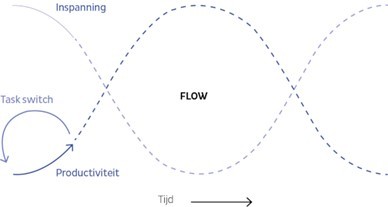Our solutions
Back
The importance of recovery moments
The more stressful an experience or situation is, the more difficult it becomes to not think about it, relax, or do something else. We could actually start worrying about it more. Leiden professor Brosschot (2007) and his research group showed that worrying keeps the stress physiology going in our body, and this was later confirmed by other research groups (Ottavaiani et al., 2015).
Recovery becomes more difficult the greater the need for it
Various studies have shown that sufficient recovery during and after work is important to prevent health problems. Exposure to stressors at work can be associated with low levels of well-being and health.
Recovery, in combination with (psychological) distance from the negative sides of work, exercise and good sleep, on the other hand, go hand in hand with well-being and health (Sonnentag, 2018).
Logically, those who are most under pressure would benefit most from actions aimed at recovery. But unfortunately, one of the interesting findings of recent research is that recovery is more difficult the more the need is. This finding is known as the 'recovery paradox' (Sonnentag, 2018).
As mentioned in the intro, the more stressful an experience or situation is, the more difficult it becomes to not think about it, to relax, or to do something else. Worrying keeps us physiologically in a heightened state of readiness, without the need for an acute stressor to be present. This prevents the body and mind from recovering efficiently.
These findings are in line with the research of (Van Laethem et al., 2016), in which employees with chronically high job demands experienced more sleep disturbances and more work-related worrying than employees with moderate or low job demands.
Recovery, in combination with (psychological) distance from the negative sides of work, exercise and good sleep, on the other hand, go hand in hand with well-being and health (Sonnentag, 2018).
Logically, those who are most under pressure would benefit most from actions aimed at recovery. But unfortunately, one of the interesting findings of recent research is that recovery is more difficult the more the need is. This finding is known as the 'recovery paradox' (Sonnentag, 2018).
As mentioned in the intro, the more stressful an experience or situation is, the more difficult it becomes to not think about it, to relax, or to do something else. Worrying keeps us physiologically in a heightened state of readiness, without the need for an acute stressor to be present. This prevents the body and mind from recovering efficiently.
These findings are in line with the research of (Van Laethem et al., 2016), in which employees with chronically high job demands experienced more sleep disturbances and more work-related worrying than employees with moderate or low job demands.
The load is related to both the amount and complexity of the work
If we want to make the work less taxing, both the quantity and complexity can be reduced. It should be borne in mind that by reducing (too much) complexity, the work may become less strenuous, but also more boring and less motivating (Nakamura & Csikszentmihalyi, 2002).
The graph opposite (Tigchelaar & De Bos, 2019) shows a visible tension between productivity, effort and the time a task takes without taking breaks. Since starting a task takes a lot of effort to increase productivity, the graph shows that in order to be in a state of 'flow' with the least effort, it is very important to close concentration leaks and is not interrupted when deep concentration is necessary.
It also shows that over time, productivity begins to decline and the effort required to complete the task increases. Taking pit stops at the right time helps to improve performance by avoiding loss of energy, efficiency and time.
The graph opposite (Tigchelaar & De Bos, 2019) shows a visible tension between productivity, effort and the time a task takes without taking breaks. Since starting a task takes a lot of effort to increase productivity, the graph shows that in order to be in a state of 'flow' with the least effort, it is very important to close concentration leaks and is not interrupted when deep concentration is necessary.
It also shows that over time, productivity begins to decline and the effort required to complete the task increases. Taking pit stops at the right time helps to improve performance by avoiding loss of energy, efficiency and time.

Recovery activities have a beneficial effect on well-being and health
Again, prevention is better than cure. When the circumstances are not too stressful, recovery is easy. Employers and employees themselves can contribute to early recovery in various ways, including by taking mini-breaks (Fritz et al., 2013), (Bennett, Gabriel, & Calderwood, 2020). Taking mini-breaks as short recovery moments outside of formal breaks is hampered by excessive work pressure, mutual competition and tense relationships, while favorable circumstances contribute to it. Leadership style and collaboration within teams can also play a role in this. Excessive work pressure has a direct negative effect on health and well-being, but also an indirect negative effect by hindering recovery.
Uncertainty about what is expected of the person and the way in which the task can be approached, lack of freedom at work and conflicts in the collaboration are burdensome. Coaching managers and other executives in a supportive and clear way of leadership contributes to structural improvements at the level of department and organization; in addition, formal agreements and terms of employment with regard to breaks at the level of the layout of the workplace, lunch options and agreements about working hours and commitment to the work process. It is important at an individual level to take into account the specific wishes and needs of the person and their home situation.
Uncertainty about what is expected of the person and the way in which the task can be approached, lack of freedom at work and conflicts in the collaboration are burdensome. Coaching managers and other executives in a supportive and clear way of leadership contributes to structural improvements at the level of department and organization; in addition, formal agreements and terms of employment with regard to breaks at the level of the layout of the workplace, lunch options and agreements about working hours and commitment to the work process. It is important at an individual level to take into account the specific wishes and needs of the person and their home situation.
Those who recover too little will have a growing need for recovery. This means that the need for rest increases, during and after work, with the primary aim of replenishing energy reserves. A high recovery need of employees is a strong predictor of reduced well-being, absenteeism due to illness and high staff turnover (Sluiter et al., 2003). Sufficient recovery is not a luxury, but crucial to remain healthy and resilient in sustainable labour.
Need help? We're here for you
Look at our FAQ or contact us
Many customers preceded you
Read about their experience with BakkerElkhuizen
Select your country and language




